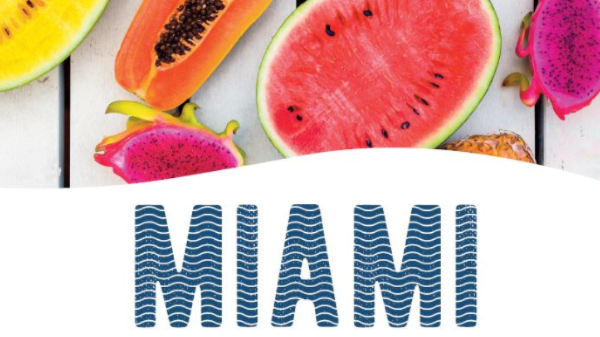Miami may be most famous for its sunshine, steamy temps, beautiful beaches, and vibrant culture, but this sizzling city also is a produce powerhouse.
Not only do growers across South Florida harvest an array of exotic fruits and vegetables, but international trade is big business for the Magic City. Thanks to its prime location, Miami is a major gateway for fresh produce moving to and from Latin America, the Caribbean, and beyond.
While growers, shippers, and distributors across South Florida face an onslaught of obstacles—from unpredictable weather to tightening rules and regulations—industry leaders remain optimistic about the coming year. Keep reading to learn what’s new in the Miami market, including top trends, challenges, and hot commodities.
South Florida Snapshot
Often referred to as the Gateway to the Americas, the colorful city of Miami is home to a large, incredibly diverse population.
The Miami metropolitan area, which includes Miami-Dade, Broward, and Palm Beach counties, now has a whopping 5.56 million residents, making it the eighth largest metro area in the country.
Miami-Dade County, which includes downtown Miami and the agricultural areas of Redland and Homestead, continues to grow by leaps and bounds. The county’s population mushroomed by more than 13 percent from 2010 to 2019.
More than half of Miami-Dade’s residents were born outside the United States. In this multilingual metro area, Spanish, English, and Creole are the most common languages, along with French and Portuguese.
Locally Grown
Thanks to the region’s tropical climate, local farmers can grow a wide variety of crops year-round. Miami-Dade boasts one of the most diverse agricultural industries in the country, producing more than $2.7 billion in economic impact each year.
Redland, a small unincorporated community about 20 miles southwest of downtown Miami near Homestead, is globally famous for its tropical fruit. Nearly 10 years ago, Miami-Dade County introduced the Redland Raised brand to promote the consumption of fresh local produce.
The region is a top producer of mangos, avocados, lychees, bananas, plantains, coconut, sapodilla, jackfruit, and passion fruit, among others. The largest avocado producing county in the Sunshine State, Miami-Dade ranks fifth in nationwide production. The county’s tropical fruit industry is currently valued at an estimated $38 million in annual sales, with an economic impact of approximately $78 million each year.
“Just miles away from the hustle and bustle of Miami and Miami Beach is the agricultural landscape of the Redland, where many of our tropical fruits are grown,” says Mary Ostlund, marketing director for Brooks Tropicals, LLC, BB #:110555 a grower-shipper that both imports and exports.
“Our SlimCado avocados are the largest avocado crop in the area,” she says. “We also grow our starfruit, passion fruit, dragon fruit, mamey, jackfruit, and lychees here in Redland.”
Ecoripe Tropicals, Inc., BB #:171219 a grower-shipper and importer based in Medley, also offers locally grown topicals.
“We’re proud to have expanded our Fresh from Florida line, which includes boniatos, coconuts, dragon fruit, specialty eggplants, guava, longan, lychee, mamey, mangos, passion fruit, sapodilla, and many more,” says CEO Marc Holbik.
“Our local produce sales have increased 5 to 10 percent per year for the last three years,” he adds, driven by retailers seeking more locally produced items.
Holbik points out that the Miami produce industry is unique in offering both locally grown items and an extensive array of imported product.
“What makes Miami so special is being both a premier growing area for tropical specialties as well as an excellent port of entry for imported produce from the Caribbean and Latin America,” he explains.
Ecoripe Tropicals works with grower-shippers based in Florida as well as 15 countries in Latin America, the Caribbean, and Southeast Asia, Holbik notes, to supply customers with more than 150 tropical and exotic fruits and vegetables.
“This allows us to serve as a shipping point for an expansive line of tropical produce,” he says. “In fact, we ship around 100 unique tropical specialty commodities in any given week.”
This is multi-part feature on the South Florida produce industry adapted from the January/February 2020 issue of Produce Blueprints.



